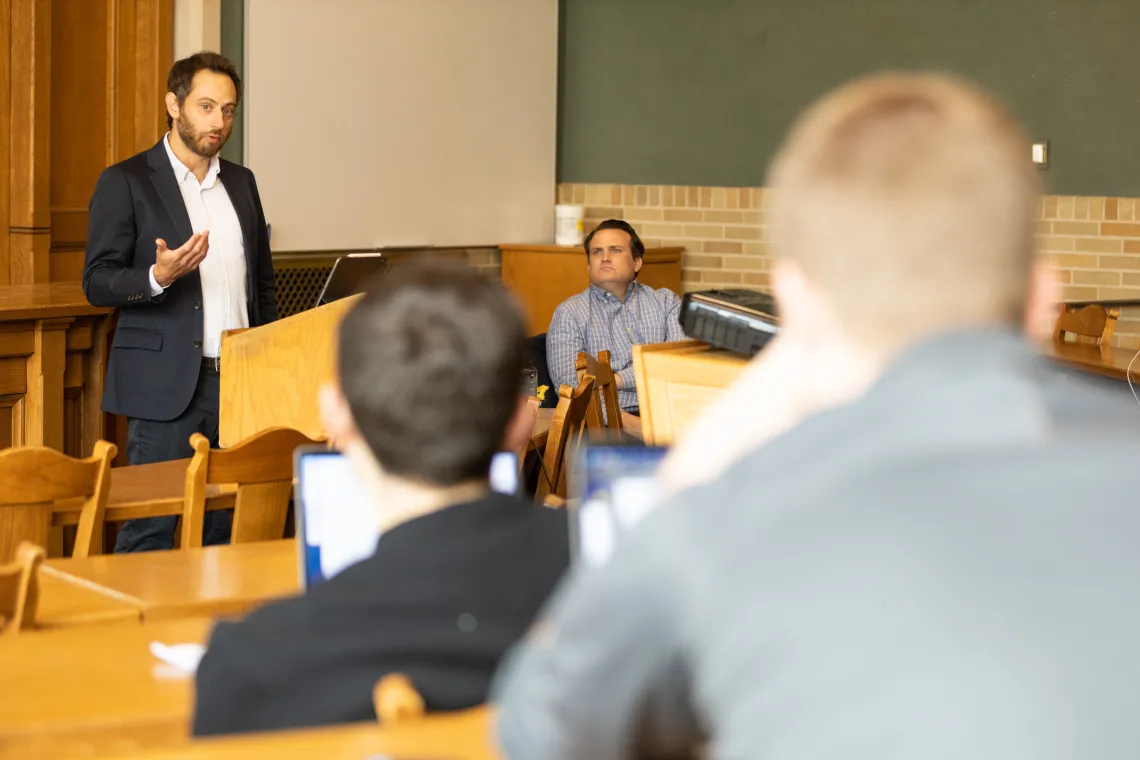For the Record: Presentations on Presidential Power, Indigenous Knowledge and Climate Adaptation, Expert Insights on Ethics, Water and More
Catch up on recent University of Arizona Law faculty accomplishments.

University of Michigan Law School Professor of Law Shalev Roisman speaking at University of Michigan Law School's Public Law Workshop
News
Bambauer Speaks at University at Buffalo Symposium on Ways to Control Misinformation on Social Media
Professor of Law Jane Bambauer attended a recent symposium hosted by the University at Buffalo’s Center for Information Integrity on “Misinformation in Social Media and What to do About it.” Bambauer spoke on social media as a vice, and discussed the strategies to reduce vice that have worked in the past, in the U.S. and abroad, and analyzed whether we should expect similar outcomes when applied to social media.
Roisman Presents at University of Michigan’s Public Law Workshop Series
Associate Professor of Law Shalev Roisman presented at the University of Michigan’s Public Law Workshop Series and led a discussion on the president’s objective and subjective legal obligations when exercising statutory grants of presidential power.
Tsosie Discusses Indigenous Knowledge and Climate Adaptation
This month, Regents Professor Rebecca Tsosie spoke alongside University of Washington Bothell Earth Sciences professor Margaret H. Redsteer, discussing the role of Indigenous knowledge in climate adaptation at Harvard’s Mahindra Humanities Center. Listen here.
Bublick Organizes Great Torts Cases Symposium
University of Arizona Law hosted the recent symposium, "Reinventing the Canon: Great Torts Cases of the 21st Century," coordinated by Dan B. Dobbs Professor of Law Ellen Bublick. The symposium was co-sponsored by University of Arizona Law, Harvard, Oxford, and American Law Institute, and focused on great torts cases of the 21st century.
Buch Attends National Innocence Network Conference
Director of the University of Arizona Innocence Project Vanessa Buch and students from the clinic attended the National Innocence Network Conference on April 14-15 in Phoenix, Arizona. The conference brought together directly impacted people, advocates, and others who work to free the innocent, prevent wrongful conviction, and provide post-release support.
UX4Justice Team Wins Best Digital Health Award at Bench to Bedside
The UX4Justice team, led by UX4Justice Director and Professor of Practice Sarah Mauet, won the Best in Digital Health Award at Bench to Bedside, Utah's premier health care innovation competition. The UX4Justice team includes University of Arizona Law 3L student Amber Shepard and three University of Utah MBA students. The team presented their work on Benefactor, a digital tool designed to help navigators and their clients submit high-quality, comprehensive applications for Social Security Disability benefits that are more likely to get approved the first time around, getting Americans the benefits that they need and qualify for more quickly and easily.
In the Media
Judge's donations cloud rulings in Catholic bankruptcy case
The Associated Press
April 20, 2023
U.S. District Judge Greg Guidry donated tens of thousands of dollars to New Orleans' Roman Catholic archdiocese and consistently ruled in favor of the church amid a contentious bankruptcy involving nearly 500 clergy sex abuse victims, an apparent conflict that could throw the case into disarray. Ethics expert Professor Keith Swisher describes the judge's donations as "more like fire than smoke."
Academics Discuss Indigenous Knowledge and Climate Adaptation at Mahindra Humanities Center
The Harvard Crimson
April 16, 2023
Regents Professor Rebecca Tsosie spoke alongside University of Washington Bothell Earth Sciences professor Margaret H. Redsteer, they discussed the role of Indigenous knowledge in climate adaptation at Harvard’s Mahindra Humanities Center.
Rules governing the Colorado River were made for the ‘past world’ and the West now faces a 21st-century nightmare as it dries up
Yahoo Finance
April 15, 2023
Federal officials released a draft plan with options for emergency measures to prop up Colorado River reservoirs, including one that for the first time envisions cuts that would be shared by all users across the watershed regardless of their established rights to water. University of Arizona Regents Professor Emeritus of Law Robert Glennon weighs in.
Colorado River: Can feds legally cut IID, other rural water district allotments?,
Desert Sun
April 12, 2023
Federal officials announced possible unprecedented, across-the-board cuts to all water contractors in three states if levels in the Colorado River’s massive reservoirs, Lake Mead and Lake Powell, fall so low that they might no longer function. University of Arizona Regents Professor Emeritus of Law Robert Glennon weighs in.
Three evictions, three stories. Why the Phoenix area eviction crisis is only getting worse
The Arizona Republic
April 17, 2023
Landlords in Metro Phoenix attempted more than 67,000 evictions in 2022. In an effort to address some of the underlying issues that tilt the legal process in property owners' favor, the Arizona Supreme Court has approved a pilot program that will allow housing advocates to train to help tenants in court and with rental negotiations. The University of Arizona College of Law is working on building a curriculum for the program.
A water crisis out West will test our politics
The Washington Post
April 12, 2023
Federal officials released a draft plan with options for emergency measures to prop up Colorado River reservoirs, including one that for the first time envisions cuts that would be shared by all users across the watershed regardless of their established rights to water. University of Arizona Regents Professor Emeritus of Law Robert Glennon said that while he had not had time to review the draft and couldn’t comment on whether it might trigger a lawsuit, the option of apportioning cuts by percentage is a necessary game-changer.
How Colorado River states would share water cuts under new federal proposal
The Arizona Republic
April 11, 2023
A draft plan with options for emergency measures to prop up Colorado River reservoirs, including one that for the first time envisions cuts that would be shared by all users across the watershed regardless of their established rights to water. If adopted this summer, it will affect dam releases starting next year. Regents Professor Emeritus Robert Glennon weighs in.
